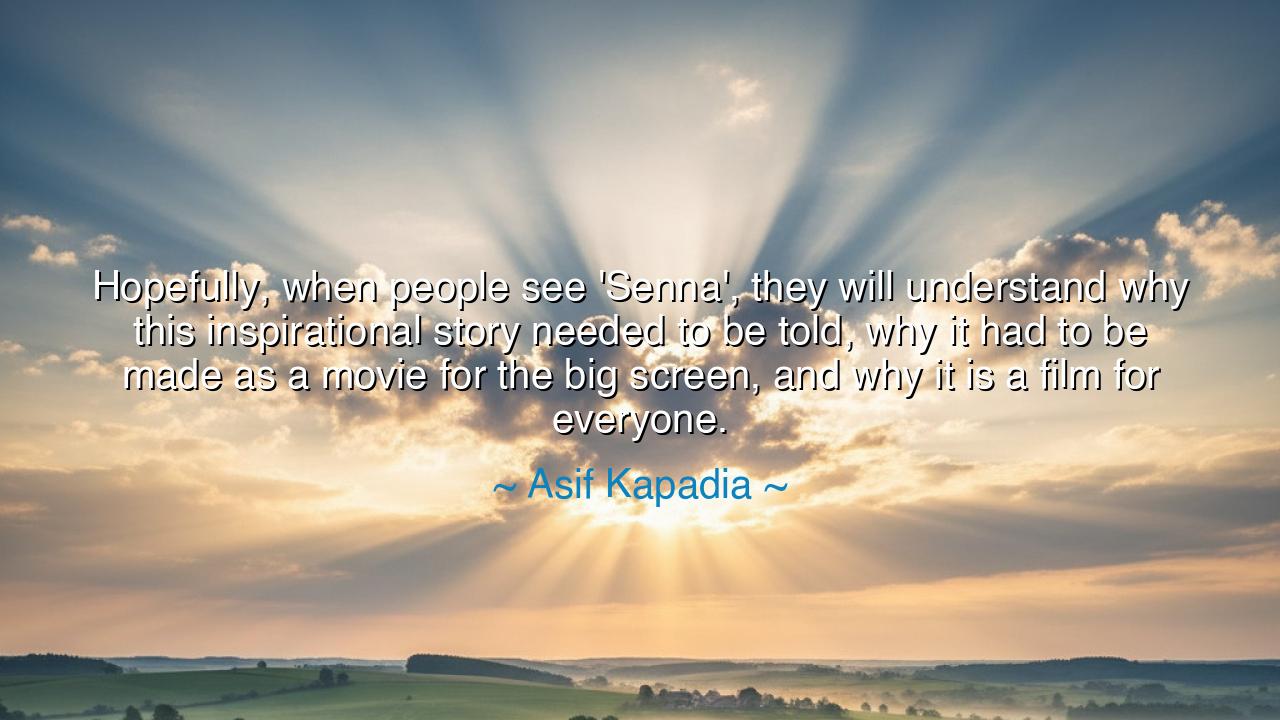
Hopefully, when people see 'Senna', they will understand why this
Hopefully, when people see 'Senna', they will understand why this inspirational story needed to be told, why it had to be made as a movie for the big screen, and why it is a film for everyone.






In the impassioned words of Asif Kapadia, we hear the voice of an artist who understands the sacred duty of storytelling: “Hopefully, when people see 'Senna', they will understand why this inspirational story needed to be told, why it had to be made as a movie for the big screen, and why it is a film for everyone.” In these lines, Kapadia speaks not merely of a film, but of a calling — the profound urge to preserve the spirit of a life that transcended sport and touched the universal heart. For him, “Senna” was not a documentary alone; it was a monument of memory, a hymn to courage, faith, and human passion. His words reveal that true stories of greatness are not bound by time, language, or circumstance. They belong to all who dare to dream, and all who seek to understand the fire that moves the human soul.
The meaning of his reflection lies in the phrase “needed to be told.” There are stories that entertain, and there are stories that reveal truth — those that speak to the eternal questions of existence: What drives a man to pursue perfection? What gives purpose to risk, to sacrifice, to struggle? The story of Ayrton Senna, the Brazilian Formula 1 driver who lived and died for his passion, is such a tale. For Kapadia, Senna’s life was not about engines and trophies, but about faith, humility, and the relentless pursuit of excellence. To bring this story to the screen was not a choice of art, but an act of reverence. It “needed” to be told because it reflected back to humanity its own potential for transcendence.
The origin of this need is ancient. Since the dawn of civilization, humankind has sought to immortalize its heroes — those rare individuals whose lives bridge the mortal and the divine. The Greeks told of Achilles, the warrior who sought glory even at the cost of death; the Romans sang of Aeneas, whose courage built a civilization; and in every culture, the poets have risen to capture such spirits, not for the few, but for the many. So too did Kapadia, in his age, take up the mantle of the bard — not with pen and lyre, but with camera and film — to ensure that Senna’s flame would not fade into the silence of history.
Senna himself was a figure of near-mythic proportion. A man of speed and serenity, of faith and ferocity, he lived as though destiny guided his every turn. When he raced, it was as if he conversed with God — not through words, but through motion, balance, and risk. His victories were not mere triumphs of machinery, but of spirit — of a human being mastering the forces that sought to contain him. Yet it was not only his victories that made him beloved, but his compassion, his humility, and his unwavering connection to his people. When Kapadia speaks of his story being “for everyone,” he means precisely this — that Senna’s journey, though written in the language of sport, speaks to the essence of all human striving: to live fully, love deeply, and leave behind light in the wake of our mortality.
Kapadia’s desire to tell Senna’s story on “the big screen” also reveals his understanding of the power of shared experience. In ancient times, stories were told around fires, where communities gathered to remember who they were. Today, the cinema is our modern firelight — a place where strangers come together in darkness to witness truth flicker before their eyes. By bringing Senna’s life to that sacred space, Kapadia ensures that his audience not only learns, but feels — that they experience the goosebumps, the tears, the awe that awaken empathy and reverence. Through this communal act, the story becomes not one man’s, but everyone’s.
Consider the tale of Alexander the Great, who, upon hearing Homer’s Iliad, wept, not because he pitied Achilles, but because he longed to live with such intensity that his story, too, would be sung for generations. Kapadia, like the poets who came before, fulfills that longing on behalf of Senna. In capturing his truth, he transforms fleeting moments into eternal inspiration. And in doing so, he bridges centuries of human storytelling — proving that technology and art, though modern in form, remain ancient in purpose.
Thus, the lesson of Kapadia’s words is this: tell the stories that must be told. Whether through art, action, or example, each of us carries within us tales that can awaken courage in others. Seek not only to create, but to illuminate. Do not fear whether your story is grand enough — if it is true, it will find its audience. For when we honor the lives that embody greatness — as Kapadia did for Senna — we remind the world of what it can be.
So let his reflection guide us: when a story moves you, do not let it fade into silence. Speak it, shape it, share it — for the inspirational stories of humanity are the lifeblood of our collective soul. They are the constellations by which future generations will navigate the darkness. And in this way, as Asif Kapadia teaches, storytelling becomes not merely an act of art, but an act of remembrance — a way of keeping the sacred alive within the human heart.






AAdministratorAdministrator
Welcome, honored guests. Please leave a comment, we will respond soon